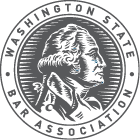State Bar Adopts New Public Defense Standards | March 14, 2024
READ THE NEW STANDARDS ON THE COUNCIL ON PUBLIC DEFENSE'S WEBPAGE
SEATTLE, WA [March 14, 2024] — The Washington State Bar Association’s (WSBA) Board of Governors has adopted new Standards for Indigent Defense Services that update public-defense guidelines in three main areas: Caseload limits, support staff, and attorney qualifications.
“I am thankful to the public defenders, prosecutors, and members across the profession who provided extensive feedback on this proposal,” said WSBA President Hunter Abell. “We all take seriously the constitutional obligation to provide adequate legal counsel to anyone facing a criminal charge. The Board’s action represents the next key step in addressing this critical issue.”
The WSBA’s Council on Public Defense recommended and drafted the revised standards after more than two years of extensive study and dialogue with public-defense stakeholders across the state. Their work was underscored and informed by a landmark national study published last fall with research that suggests public defenders are working far too many cases as their cases continue to grow more complex.
“The passage of these revised standards is a watershed moment for public defense in Washington,” said Jason Schwarz, chair of the Council on Public Defense. “These changes will provide public defenders with workable caseloads that allow them to effectively represent the accused. The standards reflect national professional norms after years of research and study. They are critical for upholding our Constitutional obligations to the accused and critical to assuring litigants have access to a fair trial.”
By Washington statute, the WSBA’s Standards for Indigent Defense Services are meant to serve as guidelines to cities and counties as they adopt their own standards for delivery of public defense services. Separately, the Washington Supreme Court maintains its own Standards for Indigent Defense, which are codified in Court rules that govern lawyer ethical and professional obligations. The Court indicated it is interested in updating its standards when, last September, it asked the Council on Public Defense to analyze the national study and make corresponding recommendations for Washington’s criminal courts. With adoption of those recommendations, the WSBA is now asking the Court to do the same.
“We are extremely appreciative of the time and commitment of the members of the Council on Public Defense and the hundreds of colleagues who provided constructive feedback,” Schwarz said. “We could not have done this without their significant investment of time and their huge swath of expertise from across the state.”
The revised standards, at a high level, shift guidelines in three main areas: They reduce by roughly two-thirds the maximum caseloads for public defenders; move from a recommendation that public defenders have access to support staff to a requirement that defense agencies maintain specific ratios of investigators, mitigation specialists, and legal assistants; and provide a broader definition of experience for public defenders to qualify to take on specific types of cases.
“While the cost of providing effective counsel is significant, it is significant that the WSBA will no longer be looking to public defenders to bear the cost of justice,” Schwarz said. “Implementing these standards will take time and cost, and we hope that all critical stakeholders will convene to resolve these larger concerns in the criminal legal system.”
FAQ
Q. What is WSBA Council on Public Defense? The Council on Public Defense is an advisory council of the WSBA that brings together representatives of the bar, private and public criminal defense attorneys, current and former prosecutors, the bench, elected officials, and the public to address new and recurring challenges that impact the public defense system. The Council on Public Defense educates and informs policy makers on issues that need reform and provides concrete proposals that are enhanced by the comprehensive nature of the council's membership. More information.
Q. What is the timeline for implementation of the new standards? The Council on Public Defense has recommended a two-year phased implementation of the new standards beginning in July 2025 to give local governments time to plan. The Council on Public Defense will continue to collaborate with statewide organizations and legislative bodies to communicate with defenders and provide necessary trainings mentioned in the updated qualifications portions of the standards.
Q. Is this the first time the WSBA has adopted standards for public defense? No. The WSBA has long been involved in the adoption of public defense standards. The WSBA Board of Governors first adopted the Washington Defender Association Standards for Public Defense Services in 1984, and a revised version in January 1990. The Board adopted slight revisions to certain elements of the standards in May 2021. The caseload standards, however, have not substantially changed since they were first adopted in 1984, at levels first issued nationally in the early 1970s. Much has changed in public defense since the last major revision of the WSBA standards, as reflected in the recently released national study and research of the Council on Public Defense that led to the new standards.
Q. What is the authority of the Standards for Indigent Defense? The WSBA standards detail the minimum requirements for attorneys representing individual clients and for state and local administrators who “manage and oversee” public defense services. The Washington State legislature requires counties and cities to adopt standards for the delivery of public defense services, regardless of whether public defense services are provided by contract, assigned counsel, or a public defender agency or nonprofit office. In doing so, RCW 10.101.030 provides that the WSBA Standards should serve as guidelines to cities and counties in adopting their standards. Compliance with these WSBA Standards ensures the consistent delivery of effective representation of individuals who face the loss of liberty or other protected rights.
The WSBA standards are consistent with, but more comprehensive than, the Washington Supreme Court’s Standards for Indigent Defense that are included in the Washington State Court Rules. The Court’s rules require attorney compliance in professional and ethical obligations, and all public defense attorneys must certify every quarter that they comply with the Court Rule Standards.
Q. What are the new standards compared to the previous standards? The final version of the new standards is published on the Council on Public Defense's webpage. A redlined version of the old standards, compared to the new standards, is in the March Board of Governors meeting materials.
Q. How is public defense funded in Washington state? In Washington, the administration of all public defense services for trial-level criminal and juvenile cases occurs at the local level. Each jurisdiction takes an individualized approach to structuring its public defense services. Some include robust, well-staffed public defense agencies, while others rely on contracts with a handful of private attorneys. In some locations the public defense oversight is handled by specialized attorneys with significant public defense experience, whereas in others the responsibility resides with local government administrators who manage other departments. The state’s Office of Public Defense provides financial assistance for certain public defense programs and cases and provides a supportive role to local governments by offering technical assistance in the planning, administration, and evaluation of local public defense services. More information.
About the Washington State Bar Association
The WSBA operates under the delegated authority of the Washington Supreme Court and exercises a governmental function authorized by the Court to license and regulate the state’s nearly 40,000 legal professionals, including lawyers, limited practice officers, and limited license legal technicians. The WSBA both regulates legal professionals under the authority of the Court and serves its members as a professional association — all without public funding. The WSBA administers the Bar admission process, including the bar exam; provides record-keeping and licensing functions; administers the lawyer discipline system; and provides continuing legal education for legal professionals, in addition to numerous other educational and member-service activities. The Bar’s mission is to serve the public and its members, to ensure the integrity of the legal profession, and to champion justice.






